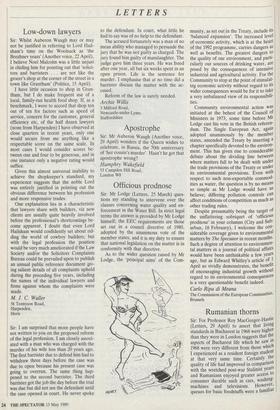Officious prodnose
Sir: Mr Lodge (Letters, 25 March) ques- tions my standing to intervene over the clauses concerning water quality and en- forcement in the Water Bill. In strict legal terms the answer is provided by Mr Lodge himself; the EEC requirements are those set out in a council directive of 1980, adopted by the unanimous vote of the member states, and it is my duty to ensure that national legislation on the matter is in conformity with that directive.
As to the wider question raised by Mr Lodge, the 'principal aims' of the Corn- munity, as set out in the Treaty, include its `balanced expansion'. The increased level of economic activity, which is at the heart of the 1992 programme, carries dangers as well as benefits. The greatest dangers to the quality of our environment, and parti- cularly our sources of drinking water, are posed by the consequences of intensive industrial and agricultural activity. For the Community to stop at the point of stimulat- ing economic activity without regard to its wider consequences would be for it to take a very unbalanced view of its responsibili- ties.
Community environmental action was initiated at the behest of the Council of Ministers in 1973, some time before Mr Lodge cast his vote in the British referen- dum. The Single European Act, again adopted unanimously by the member states, amended the Treaty by inserting a chapter specifically devoted to the environ- ment. This has given rise to considerable debate about the dividing line between where matters fall to be dealt with under the trade provisions of the Treaty or under its environmental provisions. Even with respect to such non-exportable commod- ities as water, the question is by no means so simple as Mr Lodge would have us believe; differing pollution controls can affect conditions of competition as much as other trading rules. Despite presumably being the target of the unflattering sobriquet of 'officious prodnose' in your columns (City and Sub- urban, 18 February), I welcome the con- siderable coverage given to environmental matters by The Spectator in recent months. Such a degree of attention to environmen- tal matters in a journal of political affairs would have been unthinkable a few years ago, but as Edward Whitley's article of .1. April so vividly demonstrates, the benefit of encouraging industrial growth without regard to its environmental consequences is a very questionable benefit indeed.
Carlo Ripa di Meana The Commission of the European Communities, Brussels


























































 Previous page
Previous page